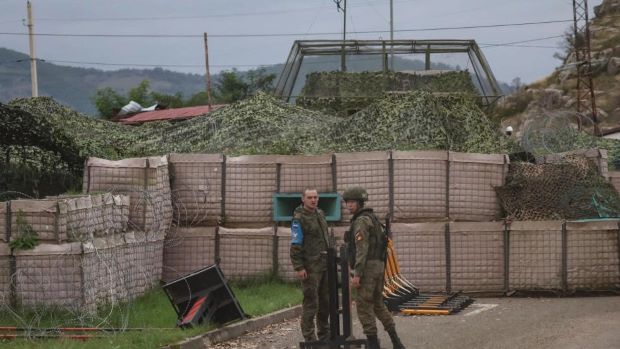Armenia signals rift with Russia as wounded arrive from Karabakh
By Thibault Marchand and Anne-Sophie Labadie
KORNIDZOR, Armenia/ BEYLAGAN, Azerbaijan – Furious relatives of ethnic Armenians trapped in Nagorno-Karabakh gathered at the Azerbaijan border to await a medical evacuation convoy on Sunday (24), as their country signalled a rift with traditional ally Russia.
The Armenian health ministry said 23 ambulances carrying a first batch of “seriously and very seriously wounded citizens of Nagorno-Karabakh” were on their way to the border, accompanied by medics and Red Cross workers.
As the human drama unfolded, the sudden Azerbaijani victory in the three-decade old conflict also triggered a geopolitical shift, with Armenia’s Prime Minister Nikol Pashinyan taking a swipe at long-standing ally Russia.
In nationally televised comments, the Armenian leader – himself a target of protests over Karabakh’s defeat – said the Russian-led Collective Security Treaty Organization (CSTO) and Moscow-Yerevan military-political cooperation were “insufficient” security guarantees.
Like a rival to NATO, the CSTO group pledges to protect other members that come under attack. But, bogged down in its own war in Ukraine, Russia refused to come to Armenia’s assistance in the latest Nagorno-Karabakh conflict, arguing that Yerevan itself recognized the disputed region as part of Azerbaijan.
Now, Russian peacekeepers are helping Azerbaijan disarm the Karabakh rebels.
Pashinyan added that Armenia should ratify the treaty which established the International Criminal Court (ICC), which has issued an arrest warrant for Russian President Vladimir Putin over the Ukraine war.
Meanwhile, tension was running high at Armenia’s Kornidzor border crossing, five kilometres from the Hakari bridge on the convoy’s route, where dozens of angry relatives had gathered to await news and one man was so frustrated he pulled out a knife.
Wild rumours spread through the agitated crowd and concern for missing relatives was mixed with fury over the lightning Azerbaijani offensive that this week seems to have defeated Karabakh’s separatist rebellion after decades of fighting.
“My son was in the army in Artsakh. He’s alive, but I’m worried for him,” said 43-year-old Alik Blbuyan, using the name Karabakh’s ethnic Armenian population gave their breakaway statelet.
“I came here to get news but I’m also hoping armed groups will cross the border. If they do, I’ll go with them to rescue my son.”
Vardan Kirakosyan comes from Machkalshen village in Nagorno-Karabakh, but was working in Russia when Azerbaijani forces imposed a blockade on the enclave nine months ago. Now the 22-year-old is on the border desperate for news about his family.
If ethnic Armenian civilians are killed by Azerbaijani forces, he threatened, they he would take revenge by murdering any “Turk” he encounters outside the country. “They’ll call me a terrorist, but I don’t give a damn,” he declared.
On the other side of the border in the Azerbaijani town of Beylagan, just outside the breakaway region, local civilians had no sympathy for their Armenian neighbours and were celebrating their government’s victory over the rebels.
State television played patriotic music paying tribute to the nation and its army, and the roadside was lined with flags and portraits of dozens of local “martyrs”, fallen in the fighting during the previous 30 years.
Famil Zalov’s 18-year-old brother was among those killed, and he’s in no mood to forgive.
“I support the operation. Our beautiful land got liberated. I’m proud my brother was avenged,” the farmer, now in his early fifties, told AFP.
Asked whether he could imagine living alongside ethnic Armenians in peace now, he said he could not: “The president has shown them the way. The corridor is open. They can use it and go away.”
While some argue that Armenians have no future in Azerbaijan, others like Minaya Valiyeva, a smallholder in her seventies, go further and argue they have no past either.
“If you take a shovel and dig in the mountains you will find belongings; the wool jacket of our grandfather. You will find our grandmother’s combs. You’ll not find anything that belongings to Armenians or Russians,” she said.
The bad blood between the communities will only fuel international concern that Azerbaijan’s sudden victory could trigger another round of persecution in a conflict that has seen abuses on both sides.
In a call on Saturday (23), US Secretary of State Antony Blinken told Armenian Prime Minister Pashinyan that Washington had “deep concern” for ethnic Armenians there, a spokesman said.
But, speaking for Baku, Foreign Minister Jeyhun Bayramov told the General Assembly: “Azerbaijan is determined to reintegrate ethnic Armenian residents of the Karabakh region of Azerbaijan as equal citizens.”
Baku will also secure further diplomatic backing from key ally Turkey, whose leader Recep Tayyip Erdogan will visit Azerbaijan’s Nakhchivan exclave on Monday.
As the first Red Cross aid convoy crossed into the disputed enclave since Azerbaijan launched last week’s offensive, government forces there said rebel “demilitarization” had begun.
Ethnic Armenian separatist fighters began surrendering weapons under a Russian-mediated agreement on Friday, said Moscow.
On Saturday, the Azerbaijan forces showed off part of the captured rebel arsenal: sniper rifles, Kalashnikov rifles, rocket-propelled grenades and four tanks painted with cross insignia.
In a sign the violence may not be over, Azerbaijan’s defence ministry on Saturday accused Karabakh Armenians of setting fire to their homes in one village to keep them from Baku’s advancing troops.
Some villagers also set fire to their homes before fleeing after Azerbaijan first began to re-establish control over parts of Nagorno-Karabakh in a six-week war in 2020.
– Agence France-Presse



Comments are closed, but trackbacks and pingbacks are open.